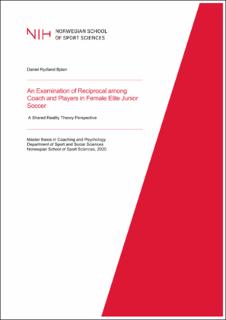| dc.description.abstract | The present master thesis is based on Shared Reality Theory (Echterhoff, Higgins & Levine, 2009; Higgins, 2919), and how the theory can expand our understanding of the reciprocity in the coach-player relationship. Previous research has been centered around the athlete’s, and somewhat the coach’s, psychosocial outcomes with respect to sports participation (Smoll & Smith, 2020; Stebbings, Taylor, & Spray, 2011, 2016). However, the reciprocal relation between coach and athlete has been less studied in past research (Jowett, 2017; Gjesdal et al., 2018).
The purpose of this study was to investigate the reciprocity in the coach-player relationship. This master thesis highlights the coach’s and players’ experiences and perceptions of their sporting partnership and how it contributes to the degree of wellbeing and performance development.
Individual semi-structured interviews were conducted with 5 participants (e.g., 4 female elite junior soccer players (Mage = 16.5) and 1 soccer coach). The participants were recruited from a soccer club in the southern part of Norway. The thesis is based on three data collections, distributed over eight months.
The results indicated that communication in the coach-player relationship is challenging, as individual adaptations must be made by the coach. First, past experiences are related to which inner states (e.g., thoughts, feelings, and attitudes; Echterhoff, Higgins, & Levine, 2009) coaches and players possess, which, in turn, is related to how coaches and players work toward their respective performance goals. Second, if the coach and the player work toward their performance goals in a different manner, sharing their inner states about how they experience a potential misfit is important. Third, to be sufficiently motivated to share their inner states, the degree of trust in the coach-player relationship is crucial (Simpson, 2007).
This master thesis reinforces the value of researching the sporting partnership between coach and player, and their reciprocal experience of each other. It is reasonable to assume that researchers need to increase their understanding of what the reciprocity of the coach-player relationship involves which, in turn, may promote performance development over time. | en_US |
